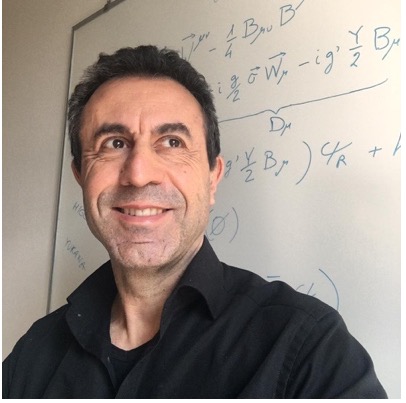IPPOG
Members
Italy

Intro
The Italian research agency dedicated to the study of the fundamental constituents of matter and the laws that govern them, under the supervision of the Ministry of Education, Universities and Research (MIUR), is the Italian National Institute for Nuclear Physics (INFN). It conducts theoretical and experimental research in the fields of subnuclear, nuclear and astroparticle physics. Groups from the Universities of Rome, Padua, Turin, and Milan founded the INFN on 8thAugust 1951 to uphold and develop the scientific tradition established during the 1930s by Enrico Fermi and his school, with their theoretical and experimental research in nuclear physics. In the latter half of the 1950s, INFN designed and built the first Italian accelerator, the electron synchrotron developed in Frascati, where its first national laboratory was set up. During the same period, INFN began to participate in research into the construction and use of ever-more powerful accelerators being conducted by CERN, in Geneva. Today INFN employs some 6000 scientists whose work is recognized internationally not only for their contribution to various European laboratories, but also to numerous research centres worldwide. All of INFN’s research activities are undertaken within a framework of international competition, in close collaboration with Italian universities on the basis of solid academic partnerships spanning decades.
As an Institution working on cutting-edge scientific issues, INFN has a significant impact on the progress of knowledge, on technological development and on the economy of the country. Aware of this role, and of the fact that it is the duty of a public body to share its activities and the results that derive from them with society, the Institute is increasingly committed to outreach and public engagement. The Institute plays an important role in the communication of physics at the national and local level, by promoting, designing and implementing initiatives for the dissemination and promotion of scientific culture, both for the general public and for specific targets. In addition to traditional initiatives, it studies and experiments new forms of communication, emphasizing the fundamental relationship between physics and other areas of knowledge. The Institute also contributes a lot to the training of high school students through scholarships, internships, teacher training and school-work projects.
Details
In Italia IPPOG è rappresentato dall’Istituto Nazionale di Fisica Nucleare (INFN). L’INFN è l’ente pubblico nazionale di ricerca, vigilato dal Ministero dell’Istruzione, dell’Università e della Ricerca (MIUR), dedicato allo studio dei costituenti fondamentali della materia e delle leggi che li governano. Svolge attività di ricerca, teorica e sperimentale, nei campi della fisica subnucleare, nucleare e astroparticellare. Le attività di ricerca dell’INFN si svolgono tutte in un ambito di competizione internazionale e in stretta collaborazione con il mondo universitario italiano, sulla base di consolidati e pluridecennali rapporti. La ricerca fondamentale in questi settori richiede l’uso di tecnologie e strumenti di ricerca d’avanguardia, che l’INFN sviluppa sia nei propri laboratori sia in collaborazione con il mondo dell’industria.
L’INFN è stato istituito l’8 agosto 1951 da gruppi delle Università di Roma, Padova, Torino e Milano al fine di proseguire e sviluppare la tradizione scientifica iniziata negli anni ‘30 con le ricerche teoriche e sperimentali di fisica nucleare di Enrico Fermi e della sua scuola. Nella seconda metà degli anni ’50, l’INFN ha progettato e costruito il primo acceleratore italiano, l’elettrosincrotrone realizzato a Frascati dove è nato anche il primo Laboratorio Nazionale dell’Istituto. Nello stesso periodo è iniziata la partecipazione dell’INFN alle attività di ricerca del CERN, il Centro europeo di ricerche nucleari di Ginevra, per la costruzione e l’utilizzo di macchine acceleratrici sempre più potenti. Oggi l’ente conta circa 6000 scienziati il cui contributo è riconosciuto internazionalmente non solo nei vari laboratori europei, ma in numerosi centri di ricerca mondiali.
JOINED: 2007
CURRENT STATUS: MEMBER
JOINED: 2017
Representative

Ezio Torassa
INFN
ezio.torassa@pd.infn.it
Ezio Torassa
Ezio is a researcher at the INFN Padua, graduated from the University of Genoa, Ph.D. from the University of Turin, worked as a postdoctoral fellow at the IN2P3 LAL Orsay and at the University of Padua. He has worked on the WA82, DELPHI, Babar, CMS, Belle II experiments. He is currently a member of the CMS and Belle II experiments. Within CMS, he worked on the search for the Higgs boson in the decay channel in two W bosons, within Belle II he is involved in the search for candidate particles to be among the possible constituents of dark matter. Ezio was among the production managers of CMS's muon detector and Belle II's TOP particle identification detector. He has been involved in outreach since 2005, has collaborated in the development of the Masterclass project since its first edition, and is currently the national co-chair of the Italian Masterclasses.
Ezio è un ricercatore dell’INFN di Padova, si è laureato presso l’Università di Genova, dottorato presso l’Università di Torino,
ha lavorato come borsista post-dottorato all’IN2P3 presso il LAL di Orsay ed all’Università di Padova. Ha lavorato negli esperimenti WA82, DELPHI, Babar, CMS, Belle II. Attualmente è membro degli esperimenti CMS e Belle II. In CMS ha lavorato alla ricerca del bosone di Higgs nel canale di decadimento in due bosoni W, in Belle II si occupa della ricerca di particelle candidate ad essere tra i possibili costituenti della materia oscura. Ezio è stato tra i responsabili di produzione del rivelatore a muoni di CMS e del rivelatore di identificazione di particelle TOP di Belle II. Si occupa di divulgazione dal 2005, ha collaborato allo sviluppo del progetto Masterclass dalla sua prima edizione, attualmente è il co-responsabile nazionale delle Masterclass Italiane.

